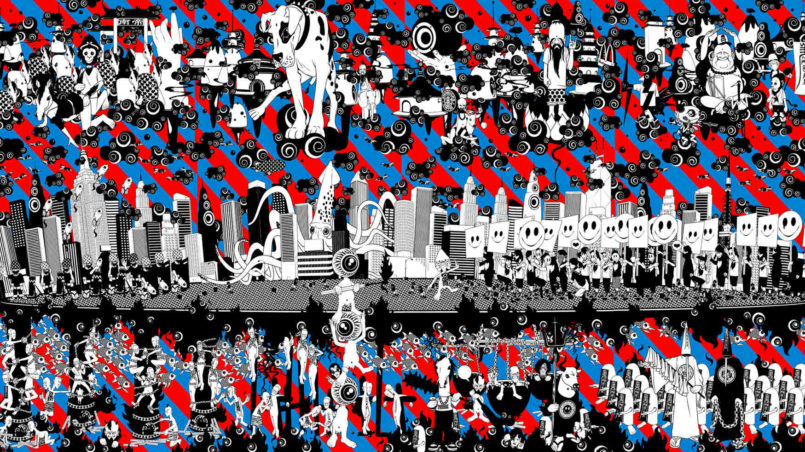Anarchy – Taboos and Language Manipulation

One of the most basic logic formulas is: if A is the same as B, and B is the same as C, then A and C must also be synonymous. The devil, as usual, lies in the detail, because of course, the sentence applies only if there is real interchangeability …
Let’s take as an example: the lion is an animal, so is the beaver – then a classical fallacy would be the conclusion that lions and beavers are the same. In this simple example, we know, of course, that the claim is incorrect, and we can also easily point out the error in thinking: animal is an umbrella term and equality is therefore only given in one direction. (Every lion is an animal, not every animal is a lion.) However, when it comes to more abstract terms, we are much worse at recognizing such errors in logic. They occasionally creep into our thinking patterns even with the best of intentions – the easier they can be applied deliberately and in a manipulative manner through hidden inaccuracy and numerous other tricks.
A glorious example is the word anarchy which literally means rulerlessness, but it is used persistently to describe chaos and terror (even the German standard dictionary, the Duden, reflects this false meaning without comment) – so the link in our minds is: the absence of domination means chaos and terror. Since this does not really happen on a conscious level, it is all the more tenaciously burned into our brains and eludes logical scrutiny:
Anyone speaking favourably of anarchy must clearly be a madman with violent fantasies for who else would, after all, wish for chaos and terror?
We feel discomfort and reluctance to focus on this, immediately want to avoid it so as not to stain ourselves with this taboo. Instinctively and obediently, we follow the dictates of acceptable versus prohibited thoughts.
We have internalized this connection so strongly that we no longer notice how, on the one hand, it is inaccurate and, on the other, perfidiously purposeful. Under the current circumstances (the relationship of people and nations to each other, the mistrust bristling with arms and the predatory economic competition, which is as merciless as it is toxic), the connection is actually given. However, this is by no means necessarily in the nature of the matter; after all, sovereignty could come about in a very different way than just through the sudden elimination of a hierarchical structure without replacement. Incidentally, the state resulting from such violent upheavals has its own name (anomie), and therefore, correctly, is not to be called anarchy at all, but even ignoring that, equating the absence of rulership with chaos is a thought trap similar to our example with the lion:
What everyone believes to be set in stone, however, becomes the reality that we create through the sum of our actions. Thus, such misleading beliefs impose mental shackles and prevent us from thinking in certain directions. In the case of the linking of rulerlessness (or, in other words, self-reliance, and self-determination) with danger and moral decay, we are, worse still, even prevented from thinking like adults at all. There must be – so we reflexively say – an authority to tell us what to do. Otherwise, the bigger kids will take away our shovel. Otherwise, there is nothing to eat. We hide these shamefully primitive fears behind all sorts of inflated concepts and decorate them with philosophical accessories – yet ultimately, we speak of nothing but childlike fears and a childish collective self-image.
Any moral judgments of one’s own were, after all, forbidden even in thought – so it has to be that these children grow up to seek yet another authority, to which they can submit themselves and all their moral responsibility too. I was ordered to, I had to do it. It was decided over my head, I had to accept it.
The really profound problems though are simply ignored, trivialized or even denied. We all know and feel – regardless of which camp we belong to – that something is wrong with our social order, our priorities, principles, and values. And yet we do not feel competent to judge the circumstances morally aptly, or we go ahead and believe the first person to come along and offer an explanation and point to some enemy responsible for our discomfort, anything as long as it does not shake our deep-seated imprints. We can be persuaded that everything is by and large alright, that we are wrong with our feeling that something gigantic, unidentifiable and very unjust is happening.
These taboos and precepts in our thinking of what we must instead believe need to be broken (among many other tasks) if we as humans want to lay our burden down and celebrate life instead of enduring it – the peculiar outrage in the face of such an obvious concept as that no human should be ruled by another, meanwhile clearly points to one of the greatest collective taboos there is.
Credits
| Image | Title | Author | License |
|---|---|---|---|
 |
Control_chaos- | Phunk Studio | CC BY-SA 3.0 |
